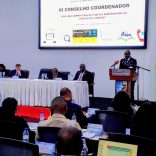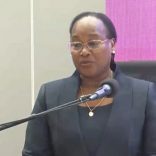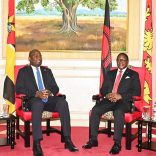Mozambique: Government wants to consolidate decentralized governance - Minister
Nyusi tells RENAMO not to demand the impossible

Filipe Nyusi - Mozambique's President
Mozambican President Filipe Nyusi on Wednesday urged the main opposition party, the former rebel movement Renamo, to stop demanding the impossible in implementing the memorandum of understanding on military matters signed in August between himself and the interim coordinator of the Renamo Political Commission, Ossufo Momade.
Giving his annual State of the Nation address to the country’s parliament, the Assembly of the Republic, Nyusi said that “important consensus” had been reached between the government and Renamo, but both sides had responsibilities under the memorandum.
The agreement is intended to guide the demilitarisation of Renamo – that is, the demobilisation and disarming of the Renamo militia, and the integration of its members into the armed forces (FADM) or the police, or back into civilian life.
Last week, the government appointed, on an interim basis, three senior Renamo officers to direct departments in the FADM. Renamo has protested that the memorandum of understanding does not envisage interim appointments, and has demanded that the three men be appointed “definitively”. At a Tuesday press conference, Momade also called for speedier implementation of the rest of the document.
In fact, the memorandum does not use the term “interim” or “definitive”, but merely speaks of “officers from Renamo”.
As for the timetable for implementation, Nyusi said the incorporation of Renamo officers “should be completed as soon as Renamo undertakes the next steps, which are its responsibility”.
The Memorandum states that Renamo must present a list of all its officers “whose situation needs to be regularised, both in terms of their ranks, and in terms of their placement within the structure of the FADM”.
“We can’t do the impossible, while other steps have not been taken”, said Nyusi, but he promised the government “will promote activities contributing to harmony among Mozambicans through reconciliation, justice and good governance”.
He paid a handsome tribute to the late Renamo leader, Afonso Dhlakama, who died of diabetes in May. Nyusi said Dhlakama’s contribution had been “decisive for drawing a line under a past charged with suspicion, hatred and death”.
In his personal interaction with Dhlakama, he added, he had always tried “to bring Mozambicans together in defence of the common interests that make us a nation. At each step, we kept alive the same principle: that which could unite us was stronger than that which was separating us”.
“We Mozambicans cannot be guided by policies that fragment us”, he declared. “We can never again, in the name of internal disputes, prejudice our development”.
Turning to the terrorist attacks in the northern province of Cabo Delgado, Nyusi made it clear he regarded this as a form of organised crime, and not as political opposition. Although the terrorists are clearly inspired by Islamic fundamentalism of an extremely violent type, Nyusi did not describe them in religious terms, but merely as “criminals”.
He noted that 189 of the insurgents had been brought to trial earlier in the year, and revealed that in the last few days “following operations to search out and neutralise the criminals, several citizens have been detained for involvement in crimes that range from recruitment and incitement to violence to the perpetration of barbaric crimes”.
He gave no examples – but the terrorists have beheaded many of their victims. “The particularly barbaric nature of the attacks”, said Nyusi, “reveals the nature of these criminals and how desperate their acts are”.
He noted that Cabo Delgado communities themselves have resisted the terrorist attacks. “In addition to the reaction of the defence and security forces the communities have responded to provocation and have actively collaborated with our forces”, he said. “As a result, the attacks of the criminals are being weakened”.
Turning to the debts of over two billion dollars contracted from the European banks Credit Suisse and VTB of Russia, by the security-related companies Ematum (Mozambique Tuna Company), Proindicus and MAM (Mozambique Assets Management), with illegal guarantees provided by the previous government, under President Armando Guebuza, Nyusi said he remains confident “in the judicial institutions of our state who have been working to clarify everything concerning this matter”.
In fact, the Attorney-General’s Office (PGR) launched an investigation into the illicit loans in 2015, and in 2017 it hired an independent auditor, the US company Kroll Associates. Despite the damning conclusions of the Kroll report, nobody has been charged with any criminal offence – not even the chairperson of all three companies, Antonio do Rosario, who obstructed the auditors to the point of throwing them out of his office.
The responsibility for the investigation is now divided between the PGR and the Administrative Tribunal (the body that oversees the legality of public expenditure).
Nyusi stressed the need to hold those who committed financial offences responsible for their actions. He added that Mozambique counted on support from its foreign partners, given the international connections of the illicit loans.
The overall fight against corruption, Nyusi said, had led, over the past two years to recovering over 56 million meticais (about 911,000 US dollars) of stolen funds, plus the seizure of 12 building and 13 luxury vehicles.
“The recovery of assets remains a challenge for the state”, said Nyusi. “The government is working to adopt specific legislation on asset recovery”.












Leave a Reply
Be the First to Comment!
You must be logged in to post a comment.
You must be logged in to post a comment.